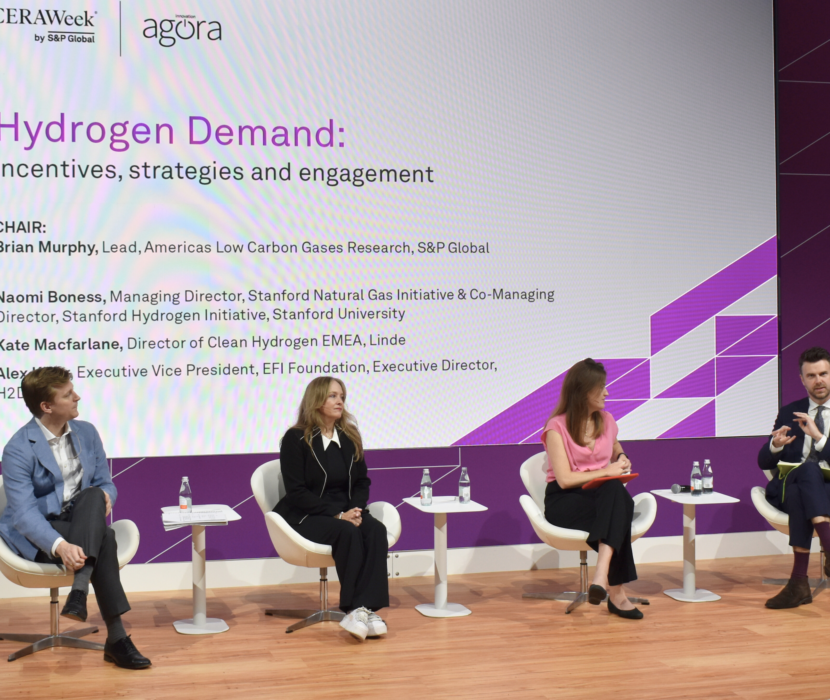
On Monday, July 12th, the Labor Energy Partnership (LEP), an initiative of the Energy Futures Initiative (EFI) and the AFL-CIO, held a virtual workshop on hydrogen and carbon capture, utilization, and storage (CCUS) in the Ohio River Valley. The workshop, one in a series on decarbonizing the economy, convened leaders from government, labor, and industry for a robust discussion on the value of a hydrogen and CCUS hub formation to the local economy and global energy transition and what is needed from government, labor, and industry to facilitate its development.
Co-hosted by EFI Founder and CEO Ernest Moniz and AFL-CIO President Richard Trumka, the workshop kicked off with keynotes from U.S. Senators Joe Manchin and Sherrod Brown, who represent constituencies of the Ohio River Valley.
Senator Manchin highlighted the importance of innovation and an “all of the above” energy strategy in addressing climate change, as emissions from many industrial processes cannot be abated through electrification. For these hard-to-decarbonize sectors, hydrogen and CCUS can offer a promising solution. Developing regional hubs for these technologies “is one of the most efficient and flexible ways to demonstrate and commercialize these technologies,” said Senator Manchin.
Senator Brown emphasized that climate change is not only an environmental crisis, but an economic one, and the importance of good-paying union jobs in the region. “It’s up to us in government, in new energy industries, in the labor movement, to show workers in Ohio and around the country that there’s a real opportunity here to make their lives better,” said Senator Brown. “Due to its geography and manufacturing history, Ohio is well suited for preserving and developing new jobs in clean energy technology, ” he continued.
“We have the history, the workers, the passion, the innovation.
Senator Brown
National White House Climate Advisor Gina McCarthy also joined the discussion, sitting with Secretary Moniz for a fireside chat. McCarthy elaborated on possible environmental justice in the Ohio River Valley, noting how reinvigorating the manufacturing and gas sectors will help the region address the job loss it has faced in recent years. “You’ve done a great job of showing why these hubs are essential,” said McCarthy, “and also of showing why, when we get this kicked off, it really will demonstrate viability in a way that’s going to attract the private sector.” She also discussed how the President might work with Congress on securing supply chains across clean energy, including for offshore wind, and the importance of labor protections in driving these industries forward.
You’ve done a great job of showing why these hubs are essential and also of showing why, when we get this kicked off, it really will demonstrate viability in a way that’s going to attract the private sector.
Gina McCarthy
Additional workshop participants included:
- Alex Kizer, Senior Vice President of Research and Analysis at EFI;
- Dr. Brian Anderson, Director of the National Energy Technology Laboratory and Executive Director of the White House Interagency Working Group on Coal and Power Plant Communities and Economic Revitalization;
- Louise Anderson, Electricity Industry Lead, World Economic Forum;
- Betsy McIntyre, Director of the Tristate Energy and Advanced Manufacturing Consortium;
- Brad Markell, Executive Director of the AFL-CIO Industrial Union Council;
- Lee Beck, International Director of Carbon Capture at the Clean Air Task Force;
- Mike Docherty, Executive Director of In-2-Market;
- Toby Rice, President and CEO of EQT;
- Roxanne Brown, International Vice President at Large, United Steelworkers; and
- Richard Fruehauf, Senior Vice President, Chief Strategy & Sustainability Officer, US Steel.
Watch a recording of the discussion here.
(Share this post with others.)




